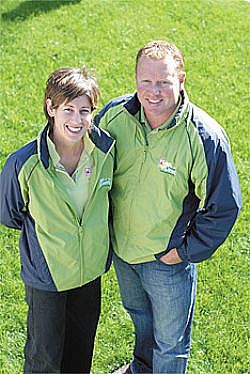Those Enterprising Cantabrians
Robin Major discovers that there is support aplenty for businesses in Canterbury, and highlights two companies that are thriving in this environment.
For companies with the passion and desire to take on the world, there is no shortage of support in Canterbury.
“When Dennis Chapman started Switchtec* in the late 1980s it was a different landscape when it came to support, but it’s vastly changed today with well developed support services providing assistance to the increasing numbers of people starting up businesses and taking the world on,” says Canterbury Development Corporation (CDC) business support manager John Hamilton.
CDC, the largely Christchurch City Council-funded business and economic development agency, has 50 people working across the region delivering a plethora of services for aspiring Chapmans. Free business start up courses help budding Cantabrian entrepreneurs determine whether to give up their day jobs. Also free enterprise training courses assist businesses with less than 50 staff to improve all aspects of managing their business – from finance and accounting to marketing and human resources.
“Often people are very strong technically but they need to improve their management capability,” says Hamilton.
Sector-based specialist training is available for high tech and tourism companies – both fast growing sectors in Canterbury. The Canterbury Innovation Incubator provides premises and support for high tech businesses taking that next step to full commercialisation. There is also specialist assistance to help companies become “investment ready”.
Connecting with others who have ‘been there and done that’ is a powerful tool for growing businesses, so CDC has put significant effort into developing a business mentor pool. This contains 250 experienced business people who volunteer their time to assist businesses with the passion and desire to take on the world.
For the rising stars, the Connect New Zealand programme provides the opportunity for a hand picked advisory board of high calibre business people to voluntarily convene for a day to assist growing companies.
“They take the business apart and change the whole paradigm; and provide hindsight in advance based on real experience,” says Hamilton.
At the Canterbury Employers Chamber of Commerce, chief executive Peter Townsend says the challenge for New Zealand, and particularly Canterbury, is to apply technology to our natural capital in a sustainable way.
“We have the soil, the sun, the water and the scenic beauty. The question is how do we add value to all of that through the use of technology? Whale Watch has done it using modern boats and 3D animation to create a world-class tourism attraction. Technology can also be used to look at the protein constituents of milk or create an online booking system for a premium farm-stay experience,” he says.
Townsend notes that with two universities, two polytechnics and several Crown Research Institutes, Canterbury has no shortage of intellectual “grunt”. The business and tertiary sectors put significant effort into talking to each other to make sure real economic value is created for the region.
“There’s a great acceptance in the tertiary sector of the desirability of working with the business sector. The Trades Innovation Institute at the Christchurch Polytech is a good example,” says Townsend. “They have built a series of workshops, which are heavily sponsored by companies like Orion and Fulton and Hogan. Now they are building a subdivision and it is giving the students integrated project management experience.”
Manufacturing is another important component of the Canterbury economy. Export-oriented manufacturers have been having a tough time in recent years with job losses in the sector and an overall retraction. However the Canterbury Manufacturers’ Association reports it is not all doom and gloom. A number of manufacturers are doing well, especially those with a strong importing component or offshore production. Local hi-tech companies such as Eaton, General Cable, SLI Systems, and Jade have shown strong performances over the past year.
*From humble beginnings, Switchtec Power Systems grew to be New Zealand’s second biggest electronics exporter.
Websites to visit:
www.cecc.org.nz
www.cdc.org.nz
www.northcanterbury.co.nz
Agriculture is an important foundation of the Canterbury economy and cut flower company Canterbury Fields is just one example of how the rural sector is using technology to add value to its products.
Canterbury Fields grows cut flowers and foliage, mostly for export, at its 27-acre property at Swannanoa in the Waimakariri district just north of Christchurch. It also manages an additional 12-acre property on behalf of another grower.
“For a lot of growers it is a lifestyle and they like working with a beautiful product, but that isn’t what we want. For us it is a matter of learning what is working and not working and if it isn’t performing financially, it has to go,” says managing director Andrea Blackadder.
High value crops such as hydrangeas, snowball tree and peony roses are processed in a state-of-the-art 800 square metre pack house located on the same site and operated by sister company Canterbury Fields Pack House.
The pack house also processes and markets other growers’ crops.
The company never intended to deal with other growers’ crops but when the local contract pack house shut down, it left peony growers with no packing facility. Now the Canterbury Fields pack house is the core business and two thirds of the product that goes through it is grown by other growers.
Blackadder recalls the first season was “not particularly successful” because they didn’t have the systems and technology in place to track the stock.
“We had to manually track 120,000 peony stems from a large number of growers with different standards. It was a nightmare.”
To help overcome these problems, the company bought software that tracks stock from the moment it enters the pack house until when it is finally shipped out.
Blackadder has also built rapport with export companies who preferred being able to deal with one supplier working to one standard.
“They became confident we could supply a consistent product and liked the idea of calling one person instead 20 people with different standards,” she says.
This year the company plans to process one million stems. The sheer growth of the business has been an enormous challenge. Before buying into the company in 2004, Blackadder worked as a horticultural consultant, providing advice to growers on technical matters. Now her job is managing people not plants.
“I got into plants because I didn’t particularly want to work with people, but I thoroughly enjoy it. I put a lot of effort into growing the team. The culture of the business is extremely important because if you don’t have buy-in you don’t have a successful business.”
Blackadder has called on the strong business background of the board of directors while her management skills have come up to speed through coaching and attending Canterbury Development Corporation courses delivered by Enterprise North Canterbury.
“They have mentored me along to a large extent and provided access to contacts. As my strengths have developed, they have pulled back.”
Developing systems documentation has allowed Blackadder to work ‘on’ rather than ‘in’ the business.
“It isn’t much fun to do but once it is in place it makes things so much easier. It’s also an interesting process for the person in the role. They can understand the complexity and feel quite good about what they do.”
Although 80 percent of Canterbury Fields product is exported, Blackadder also has a keen eye on the domestic market.
“We need to change the perception of consumers in New Zealand so flowers become something you have every day in the home. At the moment they don’t always have a good experience but things could change if the industry worked together better.”
Part of this experience is ensuring the flowers are grown in an environmentally sustainable way.
“Consumers care about the way in which their product is grown and its long term effect on the environment. We have begun to implement a five year plan which will allow us to change the way in which we grow our product – from the conventional type approach to a much more holistic approach, caring for the soil, the environment and most importantly our staff.”




